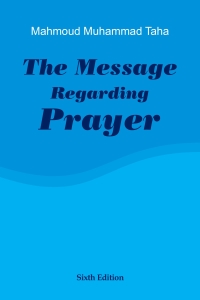The Prayer of Imitation
"Pray as you see me praying!" With these words, the Prophet instructed his followers to perform the prayer as he did, fulfilling the message of his Lord. Prayer is the Prophet's ascension by virtue of his unique status, and it is the ascension of the nation through emulation and imitation. The phrase "as you see me praying" carries both a distant and a proximate meaning.
Its distant meaning involves observing, with the eye of insight (al-basira), the state of the Prophet's sincerity in his devotion when he stands for prayer. When he says "Allahu Akbar" to commence his prayer, nothing in his heart is greater than Allah, for he has liberated himself from worldly attachments by minimizing his needs and embracing asceticism, as previously mentioned in the context of servitude.
Its proximate meaning is to observe, with the physical eye (al-basar), the outward movements of the Prophet during his prayer and to master them as well. Without seeing both the state of his heart and the movements of his body, one does not truly see him. If we merely mimic the physical movements without emulating the sincerity of his heart's orientation, we fail to fulfill his instruction: "Pray as you see me praying."
The flaw in our current prayer practice is our neglect of this dual vision. We have become proficient in the physical movements of prayer, but our hearts are distracted. When we stand in our mosques with our bodies, our hearts are often in the marketplace, on the street, or in public spaces. When we say "Allahu Akbar" in our opening invocation, a voice from the Divine truth declares: "You are lying! You are not truthful in this." For, in our hearts, wealth, status, or power is greater than Allah. Thus, our prayer does not truly qualify as prayer, and the words of Allah apply to us: "So woe to those who pray, those who are heedless of their prayer, those who want to show off and withhold the vessel (al-mā‘ūn)" (107:4-7).
He calls them "those who pray" because their actions resemble those of a worshipper. However, He states they are heedless of their prayer, meaning they are oblivious to its essence, which is the connection between them and Allah through the presence of their hearts. He then adds "those who want to show off", indicating their preoccupation with outward appearances while neglecting the inward essence, and "withhold the vessel (al-mā‘ūn)," symbolizing their withholding of their hearts from Allah. They fill their hearts with idols of love for wealth, status, and power, leaving no room for Allah.
The Infallible also said: "Perhaps a person prays but does not establish the prayer!" Such a person may appear to pray outwardly, but they do not fulfill the prayer's true essence, which is the presence of the heart during it. Thus, the essence of your prayer lies in your presence with your Lord during it, whether this presence lasts for a long or short time. Anything else, even if it involves standing in prayer for the entire night, does not constitute true prayer.
The Qur’an tells us: "Say, If you should love Allah, then follow me, so Allah will love you" (3:31). Can anyone assume they might attain Allah’s love merely by imitating the Prophet in outward actions of movement and stillness, while neglecting inward adherence?
Similarly, the Qur’an commands: "And whatever the Messenger has given you – take; and what he has forbidden you – refrain from" (59:7). The understanding here is the same: the Messenger has brought us guidance both in its distant and proximate meanings. In the distant meaning, he has conveyed to us things through the tongue of his state of being, and in the proximate meaning, through the tongue of his speech. What the Prophet gave us through the tongue of his state of being is his Sunnah, and what he gave us through the tongue of his speech is his Shari’ah.
The Prophet’s tongue of speech is truthful, and so is the tongue of his state of being, but the tongue of his state of being is more truthful than the tongue of his speech, for truth transcends expression. The Prophet said: "My words are Shari’ah, my actions are the path, and my state of being is reality." His state of being is his Sunnah.

